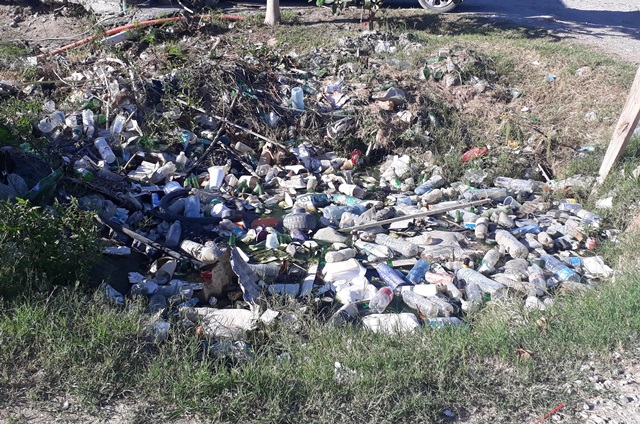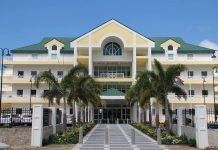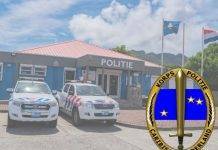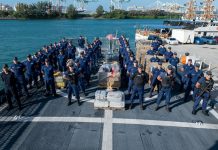
PHILIPSBURG, Sint Maarten — Nature Foundation Sint Maarten is again urging Parliament to ban single-use plastics, such as plastic bags, straws, cups and cutlery and Styrofoam food containers. Recently many neighbouring Caribbean island have already banned or announced to ban single-use plastics in order to protect the environment and decrease plastic pollution. Single-use plastic pollution is one of the biggest environmental catastrophes of this generation and these plastics are abundantly littered on St Maarten. Single-use plastics are also a major contributor to the current situation at the Philipsburg landfill.
“On St Maarten we see massive amounts of single-use plastics in our natural areas, including the ocean and Simpson Bay Lagoon, along road sides and on our beaches every single day. The day after we conduct a beach clean-up, beaches are flooded with our trash and plastics all over again. We keep on cleaning our beaches and nature areas; however it is an endless fight as people keep on littering and leaving single-use plastics behind. Several nations who banned single-use plastics are seeing significantly cleaner neighbourhoods and environments, creating a healthier and more attractive nation. St Maarten needs a ban on single-use plastics, we do not have any more time and we cannot afford to wait until tourists stop visiting our island due to the disturbing waste and littering situation” explained Melanie Meijer zu Schlochtern coordinator of Nature Foundations Reduce and Reuse Project.
Three Caribbean countries; Dominica, Jamaica and Turks and Caicos, started the New Year environmentally and banned single-use plastics since the 1st of January. Several Caribbean Nations were ahead of these islands and already implemented bans on single-use plastics in the past couple of years. Since 2012 Haiti issued a ban on the importation, manufacture or sale of plastic bags and disposable foam products, in an attempt to address the massive litter problem and protecting the coastline, shore and remaining mangrove forests. St. Vincent and the Grenadines already banned the import of Styrofoam since May 2017, as Styrofoam is made of fossil fuels and synthetic chemicals, which may leach if they come in contact with hot, greasy or acidic food, adding an unwanted dose of toxins to your drink or food. Aruba followed and banned single-use plastic bags since 2017 and will extend its ban to a total ban on all single-use plastics in 2020. Grenada had begun with a ban on the import of Styrofoam in 2018, in February this year they will ban all single-use plastics such as shopping bags, cutlery, plates, straws and cups. Already in 2016, Antigua and Barbuda started its ban of single use plastic grocery bags and recently their Prime Minister called on all nations to join them in banning the use of single-use plastics.
“Recently many countries and also several Caribbean Nations announced their bans on single-use plastics and are taking their steps to protect our environment and marine life against plastic pollution. But so far St Maarten stays behind as no concrete steps are taken yet to ban single-use plastics from our island and safeguard our nature, environment marine life, wildlife and protect our own health against these destructive plastics” stated Meijer zu Schlochtern.
The Bahamas will ban single-use plastics, such as shopping bags, food utensils, straws and Styrofoam food containers in 2020. The Bahamas also want to make the release of balloons into the air illegal, as they end up in our oceans, releasing toxins and injuring marine life. Likewise, Belize pledged to ban single-use plastic items by April this year, which has been welcomed by residents as Belizean shores are at risk from the enormous floating island of plastic in the Caribbean Sea and plastic harms marine and wildlife. Also Anguilla started the process to ban single-use plastic items; the prohibition will include single-use plastic shopping bags, utensils, and polystyrene foam containers. Furthermore, Barbabos declares a complete ban on the importation, retail, sale and use of petro-based single use plastic products within effect of 2020.
Not to speak about countries outside the Caribbean which already banned single-use plastics, such as Rwanda, a pioneer in banning single-use plastic bags, is now one of the cleanest nations on earth. Even the European Commission is in the process of banning single-use plastic products and putting the burden of cleaning up waste on manufacturers in an effort to reduce marine litter. Governments in more than 60 countries have introduced levies and bans to combat single-use plastic waste, according to U.N. Environment; it is time for St Maarten, which struggles with poor waste management and large amounts of littering, to do the same.
At least 9 million tons of plastic enters the world’s oceans each year, a rate that has increased 100 times in the past 40 years. 96% of all marine biodiversity is vulnerable to this plastic pollution. Half of all sea turtles mistake plastic for food and 90% of all sea birds ingest plastic. If current trends continue, a lot of marine life will die and there will be more plastic than fish in the ocean by 2050. Single use plastic bags, plastic straws, plastic cups, balloons, cutlery and Styrofoam food containers are some of the most environmentally damaging products on our island; these items do not biodegrade and stay in the ecosystem and oceans forever. They release a variety of chemicals during degradation, which have a negative impact on organisms, us and our ecosystems. New research even shows that plastic breakdown accelerates greenhouse gas production in the environment.




























